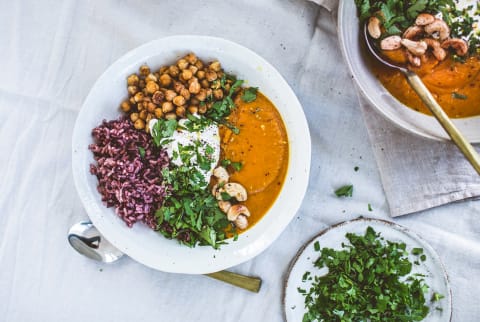The Best Foods High In Magnesium To Eat Your Way To Instant Calm


We may not hear about it as much as certain nutrients that get more airtime, but magnesium is a major mineral that’s key to many body processes such as muscle and nerve function and the regulation of our heart rate. As a cofactor for more than 300 enzyme systems, magnesium also plays a role in blood glucose management, blood pressure, hormone production, and energy production. It’s involved in building and maintaining strong bones. Because of its role in muscle and nerve function, making sure we get an adequate amount is also helpful for warding off muscle cramps and headaches and maintaining regular digestion.
Women need about 310 to 320 milligrams per day1, depending on age, and men require about 400 to 420 milligrams per day. However, many people fall short, especially if they’re on a standard American diet of minimal vegetables lots of refined grain products. Some other things that can affect your magnesium needs are activity level, pregnancy, lactation, and certain health conditions and medications. Also, because levels tend to dip around your period, women need to be especially on top of covering their bases. Some common signs of a magnesium deficiency include low energy levels and muscle cramps. In more extreme cases, heart rate changes may occur (for a full list of ways to tell if you're experiencing magnesium deficiency, check out this article).
I work on helping my clients find ways to work in foods that are naturally high in the nutrients they need rather than turning first to supplements. Some top food sources of magnesium to try are leafy green vegetables, nuts, seeds, legumes, dairy products, and whole grains. It’s also often added to products like cereals and other fortified grain products as well as nondairy milks. Feeling overwhelmed by that target number? Spreading out your intake through the day makes it less intimidating. Try these easy, delicious ways to eat away your magnesium deficiency.
1.Oatmeal.
Yet another reason to love this healthy-living breakfast cliché: Three-quarters of a cup (about a third of a cup, dry) of cooked rolled oats provides 47 mg of magnesium. Add some cinnamon for flavor and top your bowl with either a tablespoon of almond butter (45 mg) or 2 tablespoons of almonds (40 mg). Making your oats with cow’s milk adds about 25 mg, or you can use a fortified unsweetened nondairy milk.
2. Spinach smoothie.
A simple smoothie can go a long way toward boosting your magnesium intake. Blend together 1 cup of plain, low-fat or whole-milk yogurt (42 mg), 1 medium banana (32 mg), and 1 tablespoon of peanut butter (24 mg). For an extra magnesium boost, make it a green smoothie. A cup of raw spinach adds about 24 mg.
3. Kale salad with salmon or chicken.
Since leafy greens are a great source of magnesium, a big salad is a no-brainer for reaching your goal, and it also makes a blank canvas for all kinds of flavors. If you’re sick of spinach, enjoy a kale salad (23 mg per 3 cups) with salmon (26 mg per 3 ounces) and avocado (13 mg in one-third of a medium avocado). Prefer chicken? A 3-ounce serving of boneless, skinless chicken breast provides 29 mg of magnesium.
4. Brown rice bowl.
Turns out a humble brown rice bowl is a great magnesium multitasker. A half-cup of cooked brown rice provides 42 mg. Add some black beans for another 60 mg per half-cup. Putting some greens in there adds even more. Tired of spinach and kale? Try cooked broccoli (32 mg per cup). For healthy fats, drizzle on some tahini (14 mg per tablespoon) or add a few slices of avocado.
5. Edamame.
Easy enough to make in an office microwave, edamame is a handy way to up your magnesium intake. A half-cup, shelled, contributes 50 mg.
6. Seaweed.
Seaweed has become a trendy superfood lately for its sustainability factor, but sea vegetables are also super high in magnesium. Kelp is the grand-daddy of all seaweeds, with 12g of magnesium per 2 tablespoon serving—which really adds up, given that you're likely to eat far more than 2 tablespoon. You can wilt it into soups, or sprinkle dried kelp on top of salads for an umami flair.
7. Buckwheat.
Buckwheat has a whopping 393 mg of magnesium per one cup serving. It's a great base for pancakes, waffles, and other baked goods—just sub in one cup of buckwheat flour for whatever flour the recipe calls for. Because it's a bit denser, it's great to use it with other ingredients that create air, like buttermilk and yogurt.
8. Chickpeas.
One cup of chickpeas has 230 mg of magnesium. Chickpeas are a super versatile staple: you can use them in place of meat in stir-fries or chilis, or bake them up to make super crispy snack. They're also a great source of vegetarian protein. Just make sure that you look for brands that pressure cook their chickpeas, like Eden Organic, to avoid gut-irritating lectins.
Here are a few more powerful ways to boost your magnesium levels.

Jessica Cording, MS, RD, CDN, INHC is a registered dietitian, health coach, and author with a passion for helping people simplify their wellness routine and build sustainable healthy habits. She is the author of The Little Book of Game-Changers: 50 Healthy Habits For Managing Stress & Anxiety and The Farewell Tour: A Caregiver’s Guide to Stress Management, Sane Nutrition and Better Sleep. She also runs the Drama-Free Healthy Living podcast. A big believer in the mental and physical benefits of exercise, she is also a certified Pilates instructor.